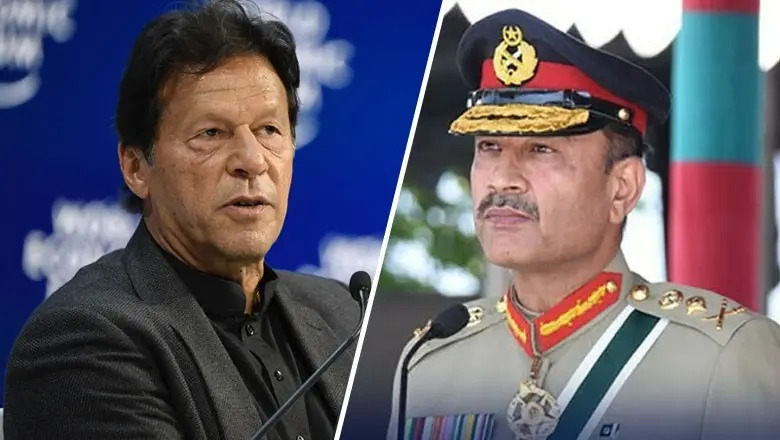In the ever-evolving landscape of Pakistani politics, a new controversy has emerged, adding fuel to an already polarized nation. Former Prime Minister Imran Khan recently claimed that he was offered a deal to move to Bani Gala under specific conditions, which he purportedly refused.
According to Khan’s lawyer, Faisal Chaudhry, the former premier turned down the offer, asserting that he would not leave until all individuals arrested without trial were released. This dramatic claim, however, has been met with an equally emphatic response from military sources, who categorically denied any such proposal or negotiations, reiterating their intent to remain uninvolved in political compromises.
The disparity between the narratives presented by Imran Khan and the military has left many questioning the motives and authenticity of these statements. Khan’s claim positions him as a leader unwilling to bow to external pressures or engage in backdoor deals, reinforcing his image as a fearless and uncompromising political figure.
On the other hand, the military’s outright denial suggests an effort to maintain neutrality and distance itself from political controversies. This clash of narratives has once again highlighted the deep-rooted tensions between political actors and state institutions in Pakistan.
Imran Khan’s assertion of being offered a deal to relocate to Bani Gala is significant, not only because of its implications but also due to its timing. Pakistan is currently grappling with economic challenges, political instability, and rising tensions between political parties and state institutions. By making such a claim, Khan may be seeking to position himself as a victim of political manipulation while portraying the establishment as willing to negotiate under certain conditions.
This narrative aligns with Khan’s broader political strategy, which often revolves around framing himself as an anti-establishment leader. Since his removal from office in 2022, Khan has consistently accused the military of interference in political matters.
His claim of rejecting a deal serves to bolster his image as a leader who prioritizes principles over convenience, appealing to his base of loyal supporters. However, without concrete evidence to substantiate these claims, questions about their authenticity linger.
Contrary to Imran Khan’s statements, the military has categorically denied any involvement in offering a deal. Senior military sources, quoted in international media, have emphasized that there is no intention to strike deals or engage in negotiations with the PTI leader.
Reports suggest that even Khan’s overtures for dialogue have been rebuffed, reflecting the military’s firm stance on maintaining its distance from political conflicts. This strong denial sends a clear message: the military does not intend to interfere in the ongoing political turmoil.
By dismissing claims of deals and negotiations, the establishment seeks to project itself as a neutral actor, focused on its constitutional responsibilities rather than political maneuvering. This approach aligns with recent efforts to recalibrate the military’s public image, which has been criticized in the past for alleged interference in political affairs.
The conflicting narratives from Imran Khan and the military have profound implications for Pakistan’s political climate. On one hand, Khan’s claim of rejecting a deal positions him as a leader willing to stand his ground, even in the face of significant pressure.
On the other hand, the military’s denial raises doubts about the veracity of his statement, suggesting it may be a calculated political move aimed at garnering sympathy and support. This clash also reflects broader trends in Pakistani politics, where narratives are often weaponized to influence public opinion.
For Khan, framing himself as a victim of establishment pressure strengthens his anti-status quo rhetoric, resonating with his core supporters who view him as a champion of change. For the military, denying involvement in political deals reinforces its commitment to neutrality and professionalism, countering accusations of meddling in civilian affairs.
The ongoing controversy underscores the deep-rooted challenges facing Pakistan’s political system. As the nation grapples with economic instability, security threats, and social unrest, the lack of trust between political actors and state institutions exacerbates existing divisions. Contradictory statements, like those between Imran Khan and the military, create confusion and erode public confidence in leadership.
To navigate these challenges, transparency and accountability are paramount. Political leaders must prioritize the nation’s stability over personal or party agendas, while state institutions must uphold their constitutional roles without overstepping their boundaries. The current political crisis is not just a test of leadership but a reflection of the urgent need for systemic reforms to restore public trust and strengthen democratic governance.
The claims and counterclaims between Imran Khan and the military highlight the fragility of Pakistan’s political environment. At a time when the nation faces critical economic and security challenges, divisive narratives and political maneuvering threaten to derail progress.
Both political leaders and state institutions have a responsibility to act with integrity, ensuring that their actions and statements contribute to national stability rather than deepening divides. Imran Khan’s claim of rejecting a deal and the military’s categorical denial must be seen in the broader context of Pakistan’s struggle for political cohesion and institutional balance.
The path forward requires not only truth and transparency but also a collective commitment to prioritizing the nation’s interests above all else. Only through unity and clarity can Pakistan overcome its current challenges and pave the way for a more stable and prosperous future.


